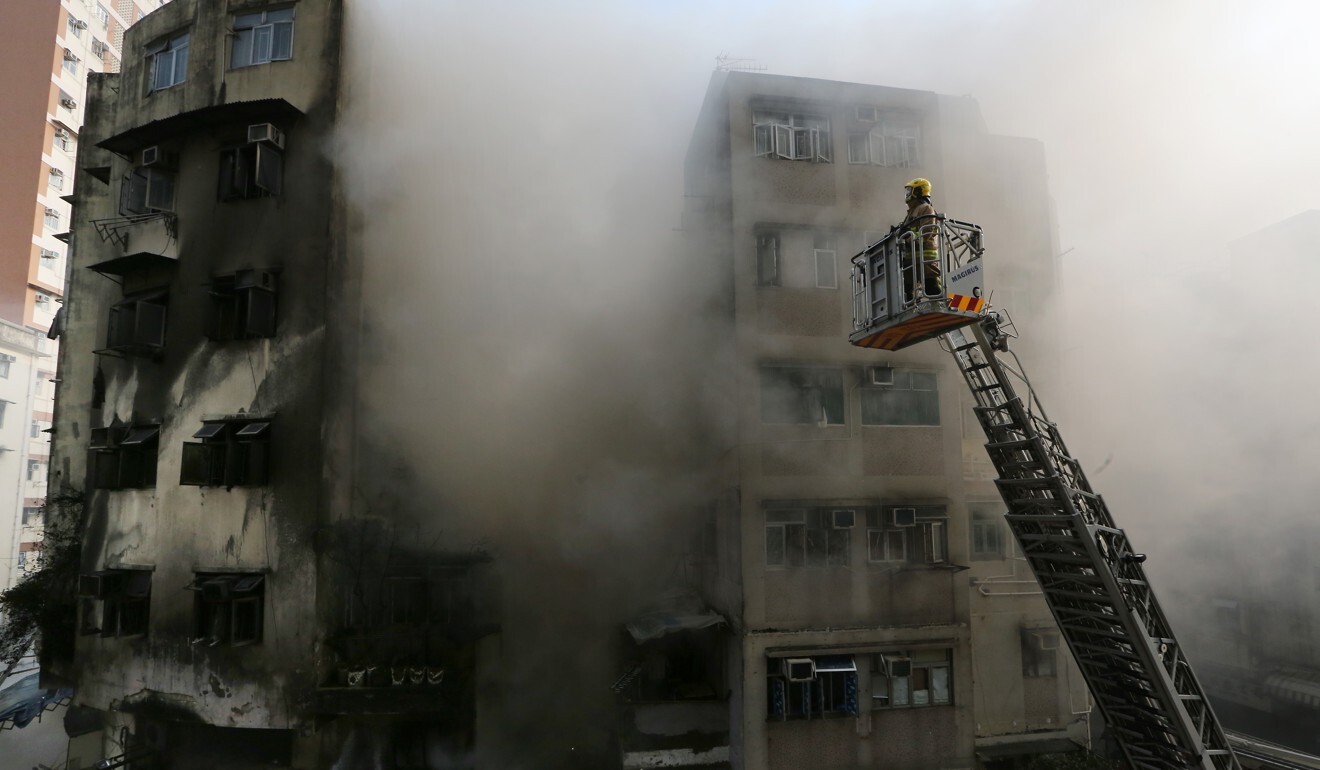
Fatal garage blast in Hong Kong caused by mechanic unqualified for fuel tank repair, High Court jury told
- Lai Chun-ho, 37, is on trial accused of three counts of manslaughter over an explosion in 2015 that left three dead
- Prosecutors say he used unsafe methods contrary to manufacturers’ requirements for a task he was not properly trained for

A mechanic on trial for manslaughter over a garage blast that claimed three lives in Hong Kong five years ago has been accused of causing the explosion while repairing a taxi’s fuel tank despite being unqualified for the job.
Lai Chun-ho, 37, allegedly used unsafe methods contrary to the manufacturers’ requirements when he attempted to replace the pump of the vehicle’s liquefied petroleum gas (LPG) tank at a garage on Wan Fung Street in Wong Tai Sin on April 26, 2015.
His handling was said to have caused the leakage of 48 litres of LPG – filling the service pit “like a reservoir” – which experts believed was sparked when an operating electric fan fell to the ground and prompted the explosion that killed three people and injured eight others, including himself.

These details finally emerged in the High Court on Thursday as prosecutors opened their case against Lai, who has pleaded not guilty to three counts of manslaughter, punishable by life imprisonment, over the deaths of Wu Hon-wai, 47, Chan Kam-por, 61, and Ng Oi-ha, 65.
A jury of four men and three women has been empanelled to hear the 15-day trial before Madam Justice Judianna Barnes.
Court documents showed Lai was accused of unlawful killing by gross negligence, through breaching a duty of care he owed to the deceased when he failed to ensure there would be no leakage or accumulation of LPG, and to prevent its ignition, while he was repairing the taxi.
Prosecutor Susanna Ku Pui-fong said the incident began when Chan, a taxi driver, found the vehicle did not run smoothly while he was driving his wife around earlier in the day to deliver invites to their daughter’s wedding, so he brought it to Wu’s garage for repairs.
Chan's wife, Ko Siu-yin, recalled: “He said he needed to fix the car in time for the night-shift driver, and told me to go home first.”
Security footage obtained from shops around the garage showed Chan driving the vehicle into the vicinity at about 2.33pm.
Lai was then seen moving the car into the garage at about 2.58pm, before going out for a smoke at 3.22pm and returning at 3.24pm. He finally emerged at 3.40pm, joining Chan and Wu who were standing on the street.
Ku said there was no direct evidence showing what Lai did during those 15 minutes in the garage, but circumstantial evidence suggested that he had removed the vehicle’s fuel tank, placed it upside down in the boot and opened it slightly – just enough that its safety valve was not activated to limit the gas flow.
“It was the only irresistible inference to be drawn,” Ku told the jury. “Lai was the only mechanic on site who knew how to change parts for LPG fuel tanks.”
Undisputed evidence showed Lai had attended the LPG vehicle servicing programme provided by the Vocational Training Council but failed the practical test to qualify as a competent person permitted to maintain, repair and replace LPG vehicle fuel systems or associated components in Hong Kong.
Lai also admitted that the garage in question was not an LPG fuel tank workshop approved by the Engineering and Mechanical Services Department.
The court heard the garage exploded at 3.41pm, shattering all the glass windows of a care home opposite and causing a fire that spread to multiple nearby shops.
Firefighters arrived to find Ng’s husband trying to return to the shop next door where she was resting in the attic, but none of them could get through the thick smoke to rescue her as the fire escalated.
It was not until 5.25pm that they managed to enter the scene and find her burnt body.
Wu also lost his life at the scene, while Chan was certified dead in hospital. Autopsies found both men had died of multiple injuries and extensive burns.

Lai was sent to hospital in a critical condition, with inhalation burns and serious burns to 35 per cent of his body surface. He underwent surgery four times and received treatment for post-traumatic stress disorder and hallucinations before he was finally discharged on June 18.
The fire was put out at 6.45pm.
Experts for the prosecution concluded there was no leakage from the fuel tank until someone meddled with it in the garage, using procedures that were considered unsafe and contrary to the manufacturers’ requirements.
And because the garage’s gate was half rolled down and that LPG is heavier than air, the gas was allowed to accumulate in the service pit, to the point that it became “like a reservoir”, the prosecutor said.
Though these experts could not be entirely sure about the source of ignition, Ku said they believed it could be attributed to a fan that dropped into the service pit.
The case continues on Friday.